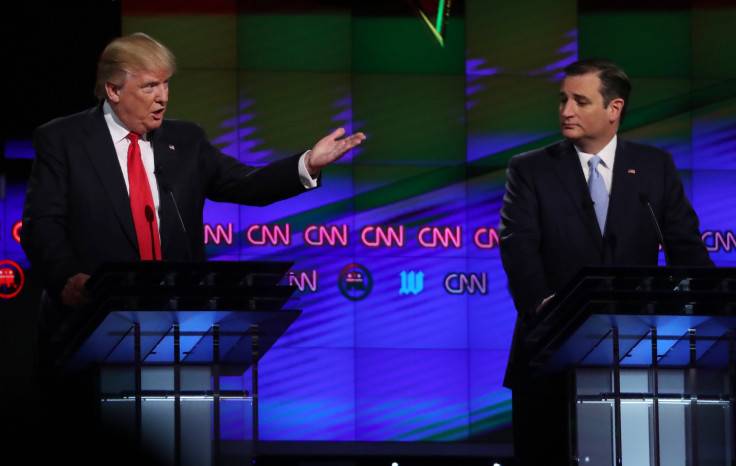Donald Trump Fact Check: Debate Highlights Ted Cruz's Relationship With Special Interests And Super PACs

Republican presidential candidates businessman Donald Trump and Texas Sen. Ted Cruz worked to paint one another Thursday in Miami during the CNN Republican debate as beholden to special interests and insincere about their commitments to fighting for regular American people, an issue that Trump has made an important aspect of his campaign.
Cruz noted that Trump has donated lots of money to politicians of all stripes in the past four decades, including Democratic front-runner Hillary Clinton, questioning his fidelity to the Republican cause before claiming that his campaign is “funded by 1.1 million contributions [from] all across this country.”
Trump quickly shot back that it’s necessary to look at Cruz’s super PACs, not just his campaign. “I know the system better than anybody else and I’m the only one who is going to be able to fix that system because that system is wrong,” Trump said, making the case that he will change campaign finance laws.
Trump, who is self-funding his campaign, was referencing the fact that Cruz has more affiliated super PACs — fundraising committees that can raise unlimited amounts of money — than any of the other presidential candidates. Those committees have raised $46.7 million to support Cruz. Overall, the Texan has raised more money than any other Republican in the race and is second only to Clinton in the 2016 field.
Cruz has increasingly emerged as the seemingly strongest opponent to take on Trump after winning seven of the 24 nominating contests in the race so far. He heads into the next states and territories this weekend and Tuesday with the second most delegates after Trump, pulling in 359 delegates compared to Trump’s 458. Florida Sen. Marco Rubio, after less than stellar performances in early contests, has just 151 delegates and has won just one state and a U.S. territory.
Cruz's wins seem to have bolstered his campaign, but it isn’t clear that any of the candidates will be able to blunt Trump’s momentum. The businessman leads in all of the polling in states that will vote Tuesday, including North Carolina, Illinois, Missouri, Ohio and Florida. Cruz comes in second in only one of those states, North Carolina, where he trails the real estate mogul by 9.7 points, according to an average of polling from Real Clear Politics.
Cruz is currently ranked in second place in national averages of polls but there is a formidable gap between him and Trump. The businessman takes in 36 percent of the national support, compared to Cruz’s 21.8 percent. Rubio comes in just behind Cruz with 18 percent of support in national polls.
Cruz has based his political identity on his fidelity to the constitution, calling himself a constitutional absolutist. He first entered the national political stage soon after he took office when he helped lead the U.S. government into a shutdown, largely because of his opposition to President Barack Obama’s signature healthcare law, the Affordable Care Act.
© Copyright IBTimes 2025. All rights reserved.






















